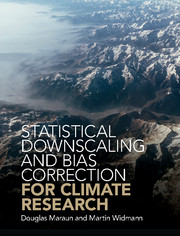Book contents
- Frontmatter
- Dedication
- Contents
- Preface
- Acknowledgements
- 1 Introduction
- Part I Background and Fundamentals
- Part II Statistical Downscaling Concepts and Methods
- Part III Downscaling in Practice and Outlook
- 15 Evaluation
- 16 Performance of Statistical Downscaling
- 17 A Regional Modelling Debate
- 18 Use of Downscaling in Practice
- 19 Outlook
- Appendix A Methods Used in This Book
- Appendix B Useful Resources
- References
- Index
16 - Performance of Statistical Downscaling
from Part III - Downscaling in Practice and Outlook
Published online by Cambridge University Press: 27 December 2017
- Frontmatter
- Dedication
- Contents
- Preface
- Acknowledgements
- 1 Introduction
- Part I Background and Fundamentals
- Part II Statistical Downscaling Concepts and Methods
- Part III Downscaling in Practice and Outlook
- 15 Evaluation
- 16 Performance of Statistical Downscaling
- 17 A Regional Modelling Debate
- 18 Use of Downscaling in Practice
- 19 Outlook
- Appendix A Methods Used in This Book
- Appendix B Useful Resources
- References
- Index
Summary
As laid out in the previous chapter, the quality of regional climate projections depends on the performance of the driving GCM (and potentially RCM) and the downscaling model in both present and future climate. GCM and RCM performance has been captured in Section 8.5 – this chapter focuses on the performance of different statistical downscaling methods. In Part II we presented the PP, MOS and weather generator approaches. Along with these, we also explained how the structure of these approaches determines their skill and limitations (Sections 11.3, 12.5 and 13.3). Here we will discuss their de facto skill to reproduce the statistical climate aspects (Section 4.2) of observational data. A broad synthesis, however, will be given in the end of this chapter.
The results that follow are to a large extent based on the comprehensive VALUE evaluation study (Maraun et al. 2015), that is mainly on the papers by Gutiérrez et al. (2017) on marginal, Maraun et al. (2017a) on temporal, Widmann et al. (2017) on spatial and Hertig et al. (2017) on extreme aspects. Other studies have investigated the marginal and often temporal performance of statistical downscaling (e.g. Semenov et al. 1998, Wilby et al. 1998, Schoof and Pryor 2001, Schmidli et al. 2007, Teutschbein and Seibert 2012, Gutmann et al. 2014, Huth et al. 2015, Rajczak et al. 2016). Some of these additionally considered spatial aspects (e.g. Ferraris et al. 2003, Frost et al. 2011, Hu et al. 2013), some focused on extremes (e.g. Haylock et al. 2006, Goodess et al. 2010, Bürger et al. 2012). To our knowledge only one study addressed multivariable aspects (Wilcke et al. 2013). We will refer to these studies whenever they complement our results.
The results we present are all from perfect predictor experiments, that is, they isolate the skill of the downscaling method – in present climate with reanalysis predictors, in pseudo-reality studies with perfect model predictors. Many of the investigated PP methods where driven with grid-box predictors. It is likely that the PP assumption is not fulfilled in several cases, such that these methods would fail when driven with GCM predictors.
- Type
- Chapter
- Information
- Statistical Downscaling and Bias Correction for Climate Research , pp. 242 - 262Publisher: Cambridge University PressPrint publication year: 2018

